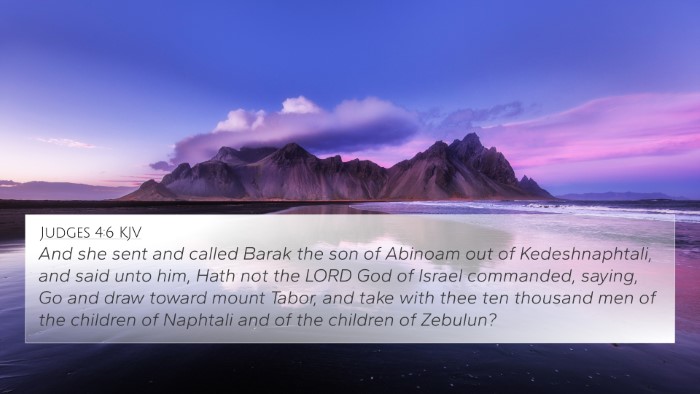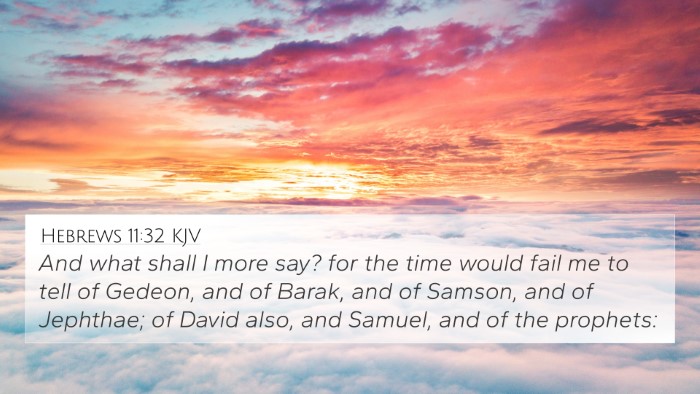Understanding Judges 6:14
Judges 6:14 states:
"And the Lord looked upon him, and said, Go in this thy might, and thou shalt save Israel from the hand of the Midianites: have not I sent thee?"
This verse occurs at a critical moment in the narrative of Gideon, where the Lord calls him to deliver Israel from oppression. The following insights are based on interpretations from several public domain commentaries.
Contextual Analysis
The context of Judges 6 is significant as the Israelites were suffering under the Midianite oppression, and God was preparing Gideon to be their leader. This moment highlights the divine initiative as God chooses and equips His servants.
Divine Call and Human Reluctance
Matthew Henry notes that God's call to Gideon comes at a time when Gideon himself feels inadequate, as he is from a lowly clan and is filled with fear. This reflects a common theme in the Bible: God chooses unlikely candidates for His work to showcase His power.
The Empowerment of God
Albert Barnes emphasizes that God's promise to Gideon, "Go in this thy might," suggests that Gideon’s strength is not from himself but from the Lord. This indicates that the true source of power for any mission comes from God, reassuring believers that they are never alone in their endeavors.
Gideon’s Commission
Adam Clarke elaborates on the term "save Israel," interpreting it as a declaration of Gideon’s role in the salvation process. His mission is divinely sanctioned, making it critical for understanding God’s overarching narrative of redemption throughout the Bible.
Thematic Connections with Other Scriptures
This verse parallels other biblical calls and instances where God empowers the seemingly weak:
- Moses' Call: Exodus 3:10-12 - God's call to Moses similarly assures him of His presence.
- Jesus Calling the Disciples: Matthew 4:19 - Where Jesus empowers fishermen to be "fishers of men."
- David's Anointing: 1 Samuel 16:11-13 - God chooses David, a shepherd boy, to be king.
- The Great Commission: Matthew 28:19-20 - Christ empowers His followers to preach the Gospel.
- Paul's Conversion: Acts 9:15 - Where God appoints Paul as a vessel to carry His name to the Gentiles.
- Jeremiah's Calling: Jeremiah 1:5-9 - God assures Jeremiah of His chosen mission despite his youth.
- Isaiah's Vision: Isaiah 6:8 - Where God asks, "Whom shall I send?" and Isaiah responds affirmatively.
Cross-Referencing Biblical Texts
Judges 6:14 can be understood within a cross-referencing framework that reveals deeper theological themes:
- Isaiah 41:10: God's assurance to not fear because He is with us.
- Philippians 4:13: "I can do all things through Christ who strengthens me," affirming the empowerment theme.
- 2 Corinthians 12:9: "My grace is sufficient for you, for my power is made perfect in weakness."
Application for Today's Believer
Judges 6:14 teaches modern believers valuable lessons about faith, obedience, and God’s empowerment:
- God Meets Us in Our Weakness: Like Gideon, believers may feel inadequate, yet God chooses and strengthens the weak.
- Assurance of Divine Presence: The promise of God's presence in our mission encourages us to take bold steps in faith.
- Recognizing Our Assignment: Understanding our God-given roles can motivate us to fulfill His purpose in our lives.
Conclusion
Judges 6:14 is a pivotal verse reflecting God's divine calling of Gideon. Through the combined insights from Matthew Henry, Albert Barnes, and Adam Clarke, we see a rich tapestry of encouragement for believers facing challenges. By employing bible cross-reference guides and tools for identifying bible verse parallels, individuals can deepen their understanding of how this verse connects with others in the thematic bible verse connections and engage in meaningful bible cross-referencing studies. It highlights the ongoing inter-biblical dialogue that shapes our faith journey, revealing that even the most reluctant among us can be empowered to accomplish great things for God's kingdom.








